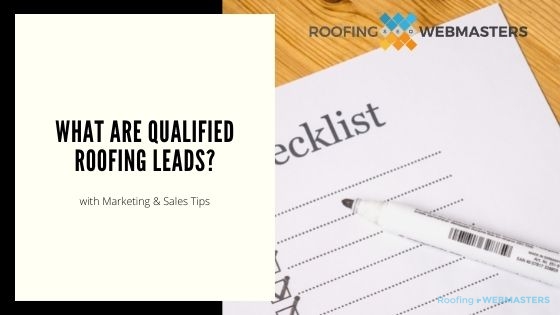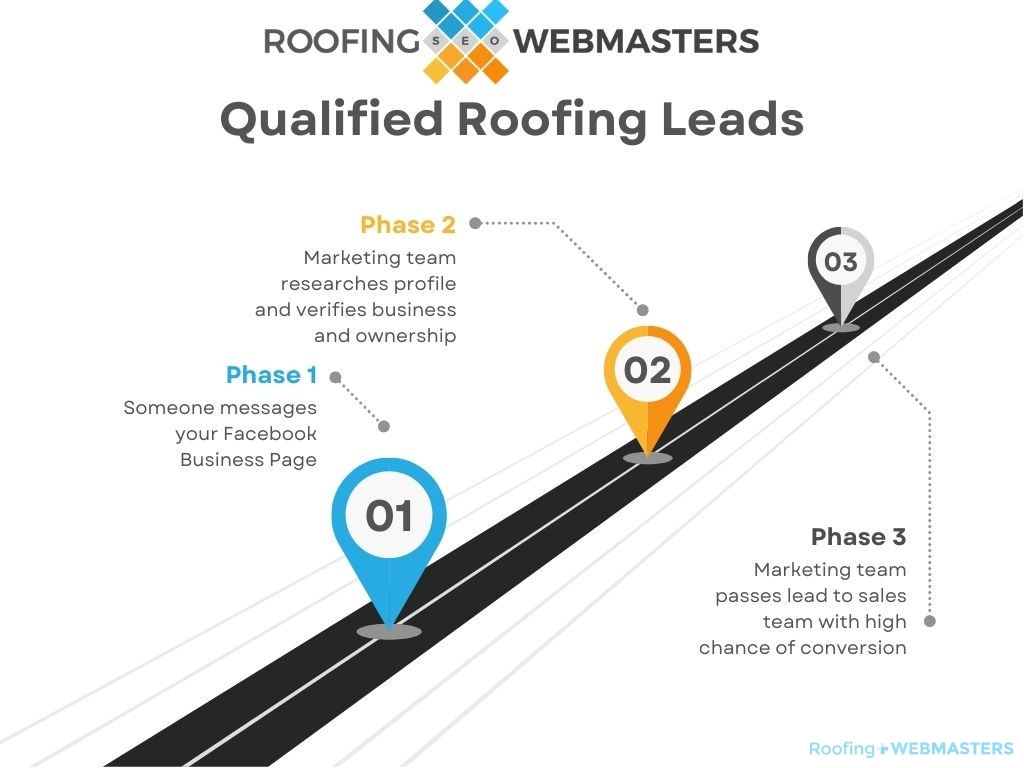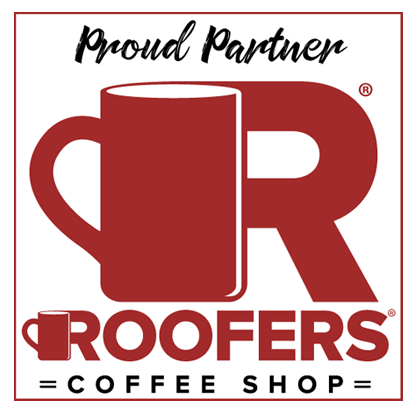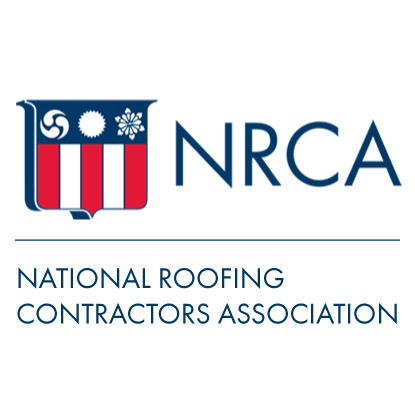Qualified roofing leads are prospects that are likely to convert into customers.
Because these leads have a high conversion rate, they are exponentially more valuable than a standard roofing lead.
When investing in roofing lead generation, it’s important to understand that each lead’s value can range from nominal to outstanding.

What Makes a Roofing Lead “Qualified”?
A qualified roofing lead is a prospect your marketing team thoroughly vets before passing through to the sales team.
The qualification process and standard may vary depending on whether you employ a 3rd party marketing agency or have your own in-house marketing staff.
How Marketing Teams Qualify Roofing Leads
Investing in roofing marketing strategies empowers your business to capture potential customers from various sources, but not all of these inquiries will be worth your time.
For example, promotional channels like websites, social media networks, and business listings are often valuable lead sources, but the quality of inquiries from these platforms will vary significantly.
Your marketing team (whether in-house or external) must vet each submission by analyzing the phone number, email address, and message content.
Oftentimes, this involves a pre-screening call or text to verify the prospect’s contact information and interest in your services.
Customer inquiries made via a website contact form submission or a Facebook message could be from a legitimate consumer or a professional spammer.

Why Are Qualified Leads Important for Roofers?
Qualifying leads is essential because it increases the conversion rate of sales teams.
When salespeople close the marketing department’s vetted leads, their overall conversion rate should skyrocket.
Take a look at a complete list of the benefits below:
Efficiency
When you have a good list of qualified leads, your sales team won’t have to hunt down cold leads and spend time and effort moving them along the initial stages of the sales funnel.
Instead, a qualified roof lead will allow your sales team to focus on leads more likely to convert and spend their time more efficiently.
Customer Service
Qualified leads provide a clearer picture of the buyer’s persona or the consumer’s preferred service.
Next, the sales team can present them with offers and information that pertain to their interests instead of pitching services unrelated to their needs.
Customers remember this kind of personalized service, so qualified leads help with customer retention.
Market Research
Qualified leads demonstrate which marketing channels are most effective in lead generation.
Using tracking methods and customer feedback, it is simple to identify the origin of qualified leads (social media marketing, search engine marketing, cold-calling, PPC ads, etc.).
Once you accumulate a steady stream of qualified roofing leads, you will likely be able to determine a pattern.
This pattern will reveal which of your marketing efforts are the most effective and which of your services have the greatest lifetime value.
Tips for Qualifying Roofing Leads
Now that you understand qualified leads better and why they’re essential, it’s time to start cultivating more for your roofing business. Here are some tips:
Align Marketing and Sales
An essential stage in the lead qualification process is an agreement between sales and marketing.
The marketing team will present the sales team with qualified leads, but the sales team needs to agree and confirm that the leads are likely to convert.
This means open and effective communication between your marketing and sales team and vital information.
Using a CRM software suite to streamline communication and lead profiling, you can stay organized.
Define Qualifications
Your sales and marketing team will need to work together to determine what exactly qualifies a lead.
How much information must the prospect provide to be considered qualified?
Should they have visited certain pages of your website? Should they have clicked on an ad?
Some agencies will push for a lower qualification threshold to drive up lead generation numbers, which can hinder your conversion rates and create a false sense of value in your marketing investment.
Don’t Be Afraid to Pivot
The roofing market changes. The needs of your customers change.
Even the weather can affect roofing market changes.
So, it would help if you revisited your qualification definitions regularly after they have been established to reflect these changes.
In-House Marketing vs. Agency for Lead Qualification
Your first instinct might be to lean towards in-house marketing departments as an ideal solution for lead qualification. After all, they have every motive to qualify the lead for your sales team properly.
In contrast, a marketing agency could be tempted to push through leads that aren’t legitimate to meet a quota or highlight the impact of its campaigns.
However, the comparison is more complex than you realize.
In-House Marketers
In-house marketers may be incentivized to withhold low-value leads from your sales team, but they also might act in bad faith to amplify their marketing skills.
It could be easier for them to blame the sales team for failing to convert leads than to take responsibility for not getting enough inquiries.
Digital Marketing Agencies
On the other hand, a digital marketing agency may have the same incentive to improve its image but provide less access to the qualification process.
Conversely, some marketing agencies are excellent at producing high-quality leads and have no reason to embellish the data.
The bottom line is this. You must trust whoever passes your qualified roofing leads to the sales team.
A competent marketing agency will produce high-quality roofing leads and vet them to the fullest extent.
Final Thoughts
In conclusion, qualified leads are prospects that meet pre-determined benchmarks of conversion rate probability.
Creating a lead qualification system lets your sales team quickly vet leads and project their lifetime value to your roofing company.
Some roofers outsource this process to third-party marketing agencies that have experience vetting prospects from various lead sources, such as websites, business listings, and social media profiles.
Other companies rely on an in-house marketing team to complete these tasks.
Each company will have a unique qualification system, but the successful ones share certain principles in common.
For example, all successful qualification processes correctly identify the conversion rate probability in their defined local roofing market.








